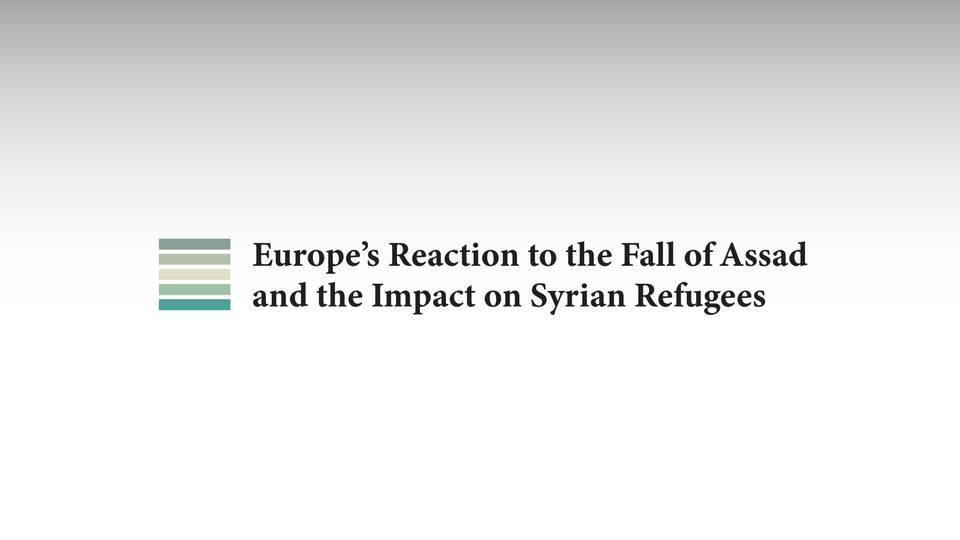
Europe’s Reaction to the Fall of Assad and the Impact on Syrian Refugees
In a shock lightening offensive, Hayat Tahrir al-Sham (HTS) toppled the government of Bashar al-Assad, putting an end to the repressive 54-year rule of the Assad dynasty. In response, member states within Europe swiftly announced pauses to the processing of asylum applications for Syrian applicants within their territory. The announcement, which has been accompanied with alarming rhetoric around deportations, has understandably caused significant distress among Syrian refugees in Europe. The Syria Justice and Accountability Centre (SJAC) maintains that states should mitigate the negative impact of the pauses by examining cases individually, granting positive decisions where there is a clear reason to do so, and issuing clear communication to asylum seekers regarding their legal rights.
As the caretaker government in Syria continues to form and with plans to govern until March, Syria remains unsafe and unstable. A myriad of questions remain as to how Ahmed al-Sharaa, or Abu Mohammad al-Jolani as he is also known, and his appointees will govern Syria in the near term and how they will shape Syria’s political future in the long term. Broad and vital questions include whether Syrian citizens will continue to face harsh repression and whether adequate protection will be extended to minority communities, concerns which have already been raised by EU officials. These questions become even more salient considering HTS’s past human rights record, which includes human rights violations such as arbitrary detention and torture as documented by SJAC.
Despite the remaining uncertainty and outstanding questions with regards to safety and security within Syria, European states responded to the fall of Assad by immediately pausing the processing of asylum procedures for Syrian refugees within their territory. These countries include Germany, Austria, Sweden, Greece, Belgium, Finland, Ireland, France, the Netherlands, Denmark, and non-EU countries such as Norway and the United Kingdom. By acting so quickly and without offering clear guidance as to what awaits Syrian asylum seekers, states created an even more hostile environment for Syrians within Europe. Not only does the pause potentially prolong the legal limbo Syrian refugees were already facing, but the decision and lack of clarity around how long the pause will last leaves Syrians without access to certain rights, such as the right to work.
To mitigate the negative impacts of the pause, states should individually assess the asylum applications and grant positive decisions where there remains a clear reason to do so based on the applicant’s claim. Simultaneously, states should refrain from issuing negative decisions in any case per UNCHR guidance, until reliable information is available regarding the security and human rights situation in Syria. To further alleviate some of the burden now placed on Syrians, states should also proactively offer clear and consistent communication regarding their right to lawfully stay within the territory of their member state, the rights they have while the examination of their asylum claims is paused, and the implications that temporary returns or visits to Syria may have on their application.
The immediate pause enacted by European states has alarmed many as it appears to build on previous anti-asylum rhetoric that had been growing in Europe and beyond, especially as many states had been attempting to declare Syria as safe prior to the fall of the Assad government. These fears seem to be confirmed as some countries like Austria and Denmark announced their intentions to begin deportation programs to Syria, although the Interior Minister of Austria clarified that there would be no immediate mass deportations.
States should not view the current political situation opportunistically and should firmly reject, under all circumstances, political rhetoric and programs designed to facilitate the involuntary and premature return of Syrian applicants to Syria. Although many Syrians are eager to travel home, reunite with loved ones, and discover the fate of their missing, states should not exploit this desire by prematurely and coercively encouraging returns to a situation that remains unsafe and unstable, as voluntary returns must be based on the free will of the returnee.
States should also be aware that it is inconsistent for states to pause asylum processing due to instability in Syria and a lack of information on the current situation while also calling for returns. Any return would have to comply with the principle of non-refoulement, which requires states to thoroughly assess the potential risk faced by refugees upon return to their country. Given that states have paused asylum procedures due to the insecure situation in Syria and the inability to assess current and accurate facts on the ground, the principle of non-refoulement could not be guaranteed and returns should not proceed.
Lastly, many Syrians are understandably eager to visit or return to Syria, even with the lack of clarity regarding long-term security and protection against persecution. However, states should not consider ongoing voluntary returns as an indication that Syria is safe or that cessation of status is merited but as an understandable reaction to the fall of a decades long repressive government. The fact remains that Syria continues to be impacted by violence, attacks, and legal violations. As such, rather than encouraging returns or taking action to revoke legal status, states should allow time for the situation in Syria to settle and instead understand whether changes to Syria’s situation will be non-temporary and durable, and whether new risks may emerge that impact the Syrian populations within their territories.
___________________________
For more information or to provide feedback, please contact SJAC at [email protected] and follow us on Facebook and Twitter. Subscribe to SJAC’s newsletter for updates on our work